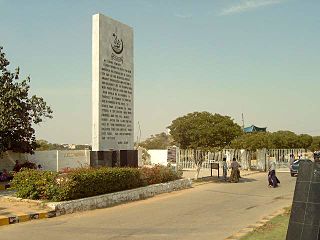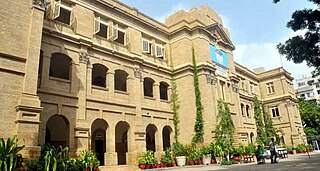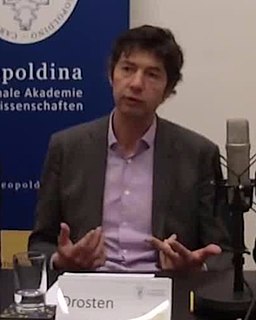Related Research Articles

A biosafety level (BSL), or pathogen/protection level, is a set of biocontainment precautions required to isolate dangerous biological agents in an enclosed laboratory facility. The levels of containment range from the lowest biosafety level 1 (BSL-1) to the highest at level 4 (BSL-4). In the United States, the Centers for Disease Control and Prevention (CDC) have specified these levels. In the European Union, the same biosafety levels are defined in a directive. In Canada the four levels are known as Containment Levels. Facilities with these designations are also sometimes given as P1 through P4, as in the term P3 laboratory.

The Dow University of Health Sciences (DUHS) is a public medical university located in the urban metropolitan area of Karachi, Sindh, Pakistan. It was founded by Sir Hugh Dow, then Governor of Sindh, in 1945.

The University of Karachi ; informally Karachi University or UoK) is a public research university located in Karachi, Sindh, Pakistan. Established through a national emergence and a followup of the University of Sindh in Jamshoro, the university was established with a status as "Federal University" in 1951 and designed by the Mohsin Baig as its chief architect.

Center of Excellence in Molecular Biology (CEMB) is a highly distinguished biological research institute in Asia, located on the West Bank of the picturesque Canal Road Lahore, Punjab, Pakistan. It is an autonomous organization that is under administrative control of University of the Punjab, Lahore, Pakistan.

The International Center for Chemical and Biological Sciences (ICCBS), also known as the Hussain Ebrahim Jamal Research Institute of Chemistry and Dr Panjwani for Molecular Medicine and Drug Research, is a federally funded national research institute and national laboratory site managed by the University of Karachi for the Ministry of Energy (MoE) of the Government of Pakistan.
The National Institute of Virology, Pune is an Indian virology research institute, and one of the translational science cells part of Indian Council of Medical Research (ICMR). It was previously known as 'Virus Research Center' and was founded in collaboration with the Rockefeller Foundation. It has been designated as a WHO H5 reference laboratory for SE Asia region.

Karachi's educational system is divided into five levels: primary ; middle ; high ; intermediate ; and university programs at undergraduate and graduate level.

Robert Ray Redfield Jr. is an American virologist. He is the current director of the Centers for Disease Control and Prevention, and the current administrator of the Agency for Toxic Substances and Disease Registry, having served in both positions since March 2018.

The Dale and Betty Bumpers Vaccine Research Center, more commonly known as the Vaccine Research Center (VRC), is an Intramural Division of the National Institute of Allergy and Infectious Diseases, one of the US National Institutes of Health. The mission of the VRC is "to conduct research that facilitates the development of effective vaccines for human disease." The primary focus of research is the development of vaccines for AIDS, but the VRC also is working to develop vaccines for Ebola and the Marburg virus, and therapeutic antibodies against SARS-CoV2.
The Chinese Center for Disease Control and Prevention is an independent agency of the National Health Commission, based in Beijing, China. Established in 1983, it works to protect public health and safety by providing information to enhance health decisions, and to promote health through partnerships with provincial health departments and other organizations. The CCDC focuses national attention on developing and applying disease prevention and control, environmental health, occupational safety and health, health promotion, prevention and education activities designed to improve the health of the people of the People's Republic of China.

Jinnah Sindh Medical University, formerly known as Sindh Medical College, is a medical university in Karachi, Sindh, Pakistan. It gained university status in June 2012.
Iqbal Hussain Qureshi 27 September 1937 – 8 December 2012) SI, FPAS, best known as I.H. Qureshi, was a Pakistani nuclear chemist and an emeritus professor of chemistry at the University of Karachi. Qureshi was the principal contributor of scientific understanding of various chemical elements: bismuth, cobalt, strontium, thallium, tritium, iron, rubidium,and zinc.
The Wuhan Institute of Virology, Chinese Academy of Sciences is a research institute on virology administered by the Chinese Academy of Sciences (CAS). Located in Jiangxia District, Wuhan, Hubei, it opened mainland China's first biosafety level 4 (BSL–4) laboratory. The institute has strong ties to the Galveston National Laboratory in the United States, the Centre International de Recherche en Infectiologie in France and the National Microbiology Laboratory in Canada.

COVID-19 testing involves analyzing samples to assess the current or past presence of SARS-CoV-2. The two main branches detect either the presence of the virus or of antibodies produced in response to infection. Tests for viral presence are used to diagnose individual cases and to allow public health authorities to trace and contain outbreaks. Antibody tests instead show whether someone once had the disease. They are less useful for diagnosing current infections because antibodies may not develop for weeks after infection. It is used to assess disease prevalence, which aids the estimation of the infection fatality rate.

The COVID-19 pandemic in Pakistan is part of the ongoing pandemic of coronavirus disease 2019 caused by severe acute respiratory syndrome coronavirus 2. The virus was confirmed to have reached Pakistan on 26 February 2020, when two cases were recorded. On 18 March, cases had been registered in all four provinces, the two autonomous territories, and Islamabad Capital Territory, and by 17 June, each district in Pakistan had recorded at least one confirmed case of COVID-19.
This article documents the timeline of the COVID-19 pandemic in Pakistan.

Christian Heinrich Maria Drosten is a German virologist whose research focus is on novel viruses (emergent viruses). During the COVID-19 pandemic, Drosten came to national prominence as an expert on the implications and actions required to combat the outbreak in Germany.
Jason S. McLellan, The Robert A. Welch Chair in Chemistry at The University of Texas at Austin, is a structural biologist and associate professor in the Department of Molecular Biosciences who specializes in understanding the structure and function of viral proteins, including those of coronaviruses. His research focuses on applying structural information to the rational design of vaccines and other therapies for viruses, including SARS-CoV-2, the novel coronavirus that causes COVID-19. McLellan and his team collaborated with researchers at the National Institute of Allergy and Infectious Diseases’ Vaccine Research Center to design a stabilized version of the SARS-CoV-2 spike protein, which biotechnology company Moderna used as the basis for the vaccine candidate mRNA-1273, the first COVID-19 vaccine candidate to enter phase I clinical trials in the U.S. At least three other vaccine candidates use this modified spike protein: those from Pfizer and BioNTech; Johnson & Johnson and Janssen Pharmaceutica; and Novavax.
Javed Iqbal Kazi (1955–2014) was a Pakistani Pathologist specialized in Renal pathology, professor and chairman of Histopathology at City University of Health Sciences, Karachi - formerly, Karachi Medical & Dental College, Sindh Institute of Urology & Transplantation, Dr. Ziauddin Hospitals & National Institute of Blood Diseases and served as Dean of medicine, University of Karachi. He was also the board member of Journal of Pakistan Medical Association since 2005. He established the department of Histopathology at Sindh Institute of Urology & Transplantation, Karachi, in 1995 and is said to have established Renal and Transplant Pathology in Pakistan
References
- 1 2 imedia.com.pk, Interactive Media Pakistan-. "International Center for Chemical and Biological Sciences". iccs.edu. International Center for Chemical and Biological Sciences. Retrieved 13 May 2020.
- ↑ "KU ICCBS established National Institute of Virology :)" . Retrieved 13 May 2020.
- ↑ "KU institute helps Indus Hospital increase COVID-19 diagnosis capacity". www.thenews.com.pk. Retrieved 13 May 2020.
- ↑ Rizvi, Safdar (18 March 2020). "On the cusp: National Institute of Virology, like many other organizations, are working to develop its own coronavirus diagnostic kit". Theظ Express Tribune. Retrieved 13 May 2020.
- ↑ "Sindh plans to set up modern virology lab - Pakistan Today". www.pakistantoday.com.pk. Pakistan Today, 2020. 2 February 2020. Retrieved 13 May 2020.
| This article about the COVID-19 pandemic is a stub. You can help Wikipedia by expanding it. |
| This Pakistan-related article is a stub. You can help Wikipedia by expanding it. |